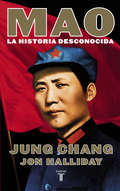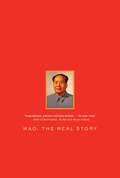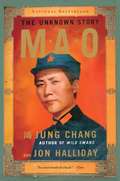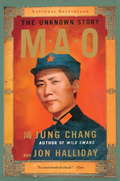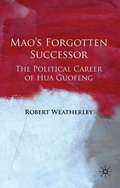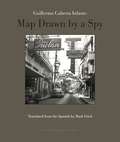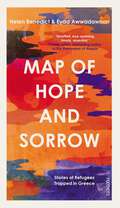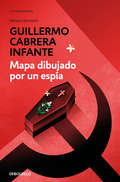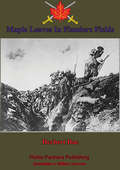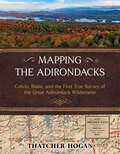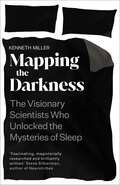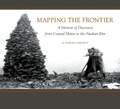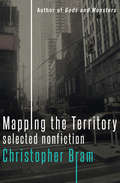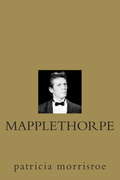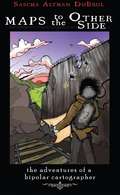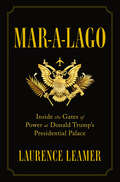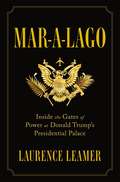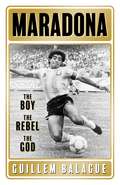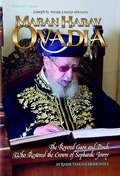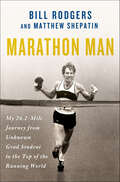- Table View
- List View
Mao: La Historia Desconocida
by Jung ChangLa biografía definitiva de Mao Zedong. Jung Chang y el historiador Jon Halliday, su marido, han escrito una biografía de Mao realmente sobrecogedora. Basada en diez años de investigación y en las entrevistas realizadas a muchas de las figuras que se movieron en los círculos más cercanos a Mao -y que hasta ahora no habían hablado- y con casi todo aquel que, fuera de China, mantuvo alguna relación significativa con el líder chino, ésta es la biografía de Mao más seria y acreditada que se ha escrito. Después de conquistar China, a partir de 1949 Mao tuvo el secreto objetivo de dominar el mundo. En la persecución de esta fantasía causó la muerte de 38 millones de personas en la mayor hambruna de la historia. En conjunto, bajo el gobierno de Mao perecieron, en tiempos de paz, más de 70 millones de seres humanos. La autora nos lleva a las sombrías estancias de su corte y nos deja observar el drama hasta en los rincones más recónditos. La personalidad de Mao y su relación con sus esposas, hijos y amantes salen a la luz por primera vez. Reseñas:«Pocos libros están destinados a cambiar la historia, pero este lo hará.»George Walden, Daily Mail «Jung Chang y Jon Halliday entran en una crítica salvaje que, basándose en numerosísimas fuentes -incluidas las soviéticas-, acabarán por barrer las miasmas de engaño e ignorancia que todavía envuelven la vida de Mao a los ojos de muchos ciudadanos occidentales.»Max Hastings, Sunday Telegraph «Una obra magistral. Esta magnífica biografía destruye metódicamente cada pilar de las reivindicaciones de Mao. Un logro.»Nicholas D. Kristof, The New York Times Book Review «Un triunfo. Un asombroso retrato de la tiranía, la degeneración, los asesinatos en masa y la promiscuidad, una batería de bombas para el revisionismo histórico y una soberbia pieza de investigación. La primera biografía privada y política del mayor monstruo de los monstruos.»Simon Sebag Montefiore, The Sunday Times «Lo que Chang y Halliday han hecho es inmenso y sobrepasa, dentro del ámbito de las biografías, todo lo que se había hecho anteriormente.»Jonathan Mirsky, The Independent «Chang y Halliday arrojan una luz nueva y reveladora sobre cada uno de los episodios de la tumultuosa vida de Mao. Un libro estupendo.»Michael Yahuda, The Guardian «Este libro es una bomba atómica.»Donald Morrison, TIME «Una obra que pone de manifiesto que comunismo y destrucción son sinónimos, pese a la admiración que la mencionada ideología recibió y sigue recibiendo desde determinadas instancias académicas y culturales.»Alfredo Crespo, El imparcial
Mao: The Real Story
by Alexander V. Pantsov Steven I. LevineThis major new biography of Mao uses extensive Russian documents previously unavailable to biographers to reveal surprising details about Mao’s rise to power and his leadership in China. Mao Zedong was one of the most important figures of the twentieth century, the most important in the history of modern China. A complex figure, he was champion of the poor and brutal tyrant, poet and despot. Pantsov and Levine show Mao’s relentless drive to succeed, vividly describing his growing role in the nascent Communist Party of China. They disclose startling facts about his personal life, particularly regarding his health and his lifelong serial affairs with young women. They portray him as the loyal Stalinist that he was, who never broke with the Soviet Union until after Stalin’s death. Mao brought his country from poverty and economic backwardness into the modern age and onto the world stage. But he was also responsible for an unprecedented loss of life. The disastrous Great Leap Forward with its accompanying famine and the bloody Cultural Revolution were Mao’s creations. Internationally Mao began to distance China from the USSR under Khrushchev and shrewdly renewed relations with the U.S. as a counter to the Soviets. He lived and behaved as China’s last emperor.
Mao: The Unknown Story
by Jung Chang Jon HallidayThe most authoritative life of the Chinese leader every written,Mao: The Unknown Storyis based on a decade of research, and on interviews with many of Mao's close circle in China who have never talked before -- and with virtually everyone outside China who had significant dealings with him. It is full of startling revelations, exploding the myth of the Long March, and showing a completely unknown Mao: he was not driven by idealism or ideology; his intimate and intricate relationship with Stalin went back to the 1920s, ultimately bringing him to power; he welcomed Japanese occupation of much of China; and he schemed, poisoned, and blackmailed to get his way. After Mao conquered China in 1949, his secret goal was to dominate the world. In chasing this dream he caused the deaths of 38 million people in the greatest famine in history. In all, well over 70 million Chinese perished under Mao's rule -- in peacetime.
Mao: The Unknown Story
by Jung Chang Jon HallidayThe most authoritative life of the Chinese leader every written, Mao: The Unknown Story is based on a decade of research, and on interviews with many of Mao&’s close circle in China who have never talked before — and with virtually everyone outside China who had significant dealings with him. It is full of startling revelations, exploding the myth of the Long March, and showing a completely unknown Mao: he was not driven by idealism or ideology; his intimate and intricate relationship with Stalin went back to the 1920s, ultimately bringing him to power; he welcomed Japanese occupation of much of China; and he schemed, poisoned, and blackmailed to get his way. After Mao conquered China in 1949, his secret goal was to dominate the world. In chasing this dream he caused the deaths of 38 million people in the greatest famine in history. In all, well over 70 million Chinese perished under Mao&’s rule — in peacetime.
Mao’s Forgotten Successor
by Robert WeatherleyHua Guofeng succeeded Mao in 1976, emerging almost out of nowhere following an unexceptional career in Shanxi and Hunan. In just over two years, Hua had been eclipsed by Deng Xiaoping, a more politically shrewd, progressive and charismatic figure. If Hua's rise to power was remarkable, then this fall was even more so.
Map Drawn by A Spy
by Guillermo Cabrera Infante Mark FriedFound in an envelope in Guillermo Cabrera Infante's house after his death in 2005, Map Drawn by a Spy is the world-renowned writer's autobiographical account of the last four months he spent in his country. In 1965, following his mother's death, Infante returns to Cuba from Brussels, where he is employed as a cultural attaché at the Cuban embassy. When a few days later his permission to return to Europe is revoked, Infante begins a period of suspicion, uncertainty, and disillusion. Unable to leave the country, denied access to party officials, yet still receiving checks for his work in Belgium, Infante discovers the reality of Cuba under Fidel Castro: imprisonment of homosexuals, silencing of writers, the closing of libraries and newspapers, and the consolidation of power. Both lucid and sincere, Map Drawn by a Spy is a moving portrayal of a fractured society and a writer's struggles to come to terms with his national identity.
Map of Hope and Sorrow: Stories of Refugees Trapped in Greece
by Helen Benedict Eyad AwwadawnanThe stories of refugees who fled violence or persecution only to become trapped in the worst refugee camps in Europe.Helen Benedict, award-winning British-American professor of journalism at Columbia University, teams up with Syrian writer and refugee, Eyad Awwadawnan, to present the stories of five refugees who have endured long and dangerous journeys from the Middle East and Africa to Greece. Hasan, Asmahan, Evans, Mursal and Calvin each tell their story, tracing the trajectory of their lives from homes and families in Syria, Afghanistan, Nigeria and Cameroon to the brutal refugee camps, where they are trapped in a strange and hostile world. These are compelling, first-person stories of resilience, suffering and hope, told in a depth rarely seen in non-fiction, partly because one of the authors is a refugee himself, and partly because both authors spent years getting to know the interviewees and winning their trust. The women and men in this book tell their stories in their own words, retaining control and dignity, while revealing intimate and heartfelt scenes from their lives.
Mapa dibujado por un espía
by Guillermo Cabrera InfanteLas memorias más políticas de Guillermo Cabrera Infante, crónica de su desencanto ante la Revolución y su decisión de exiliarse definitivamente Libro de memorias casi secreto e inédito a la muerte del autor, Mapa dibujado por un espía narra los apuros que vivió Guillermo Cabrera Infante en el verano de 1965, cuando regresó a Cuba desde Bélgica para asistir al entierro de su madre. Fue el momento de abrir los ojos a la vertiente totalitaria de la Revolución, cuyas autoridades le negaron la visa de salida, obligándolo a permanecer cuatro meses en la isla hasta encontrar una nueva vía de escape a Europa. La crónica de ese tiempo muerto refleja un mundo espectral y desmoronado, así como el desconcierto de quien no consigue despertar de las pesadillas de la Historia. Reseñas:«La narración implacable de un proceso moral y el testimonio de una decisión valiente.»Enrique Macari, Letras Libres «Conmovedor, lúcido, elegante, honrado en la desnudez con la que se muestra ante el lector.»Ernesto Calabuig, El Cultural
Maple Leaf in Space: Canada's Astronauts
by John MeladyMarc Garneau, Roberta Bondar, Julie Payette, Robert Thirsk, Chris Hadfield, and more recently, Guy Laliberté, the founder of Cirque de Soleil, all have one thing in common: they’re some of the very few Canadians who have been in space. The launch of a spaceship is terribly exciting. That’s why thousands of people come to watch. They laugh, cheer, and applaud as the rocket rises. They see the smoke, steam, and white-hot fire as millions of litres of fuel burn in seconds. They feel the chest-thumping impact of the sound. Then they stare upward for a long time until they can no longer see even a tiny speck in the distant sky. By that time, the craft is in space. Canada’s astronauts come from across the nation: from farms, cities, and little towns. They went to large schools and to small ones. Maple Leaf in Space showcases these amazing Canadians who have ventured off our planet and delivers some of the thrill of what that’s like.
Maple Leaves In Flanders Fields
by Admiral Sir Albert Hastings Markham K.C.B. Herbert RaeIt was the celebrated Canadian physician and poet Lieutenant Colonel John McCrae that wrote the famous lines "In Flanders fields the poppies blow" as an opening to his famous poem 'In Flanders Fields'. His countrymen had shed their blood copiously in fighting the Germans on the Western Front and earned an outstanding reputation as fighting troops. Despite perhaps lacking a bit of 'spit and polish', they would be exchanged by no Allied commander for other troops.His compatriot George Gibson wrote 'Maple Leaves in Flanders Fields' as a lasting testament of the achievements and character of his fellow Canadian soldiers. His book is not a bold statement of the engagements, battles and victories that the Canadians were involved in, but rather the story of the Canadians by a Canadian with a humorous tone and self-effacing modesty. Although there are many battle scenes depicted with great skill and vividness, it is perhaps the moments of quiet that display the character of the Canadian troops most; for example, an exchange at a hand-over of the line:Sentry. "Halt! Who goes there?"Answer. "First Grenadiers."Sentry. "Pass, first Grenadiers; all's well." Sentry. "Halt! Who goes there?"Answer. "What the Hell is that to you?" Sentry. "Pass, Canadians; all's well."A fine testament to the achievements and noble sacrifice of the Canadian Corps on the Western Front.Author -- Gibson, George Herbert Rae, 1881-1932Introduction --Admiral Sir Albert Hastings Markham, K.C.B. (11 November 1841 - 28 October 1918)Text taken, whole and complete, from the edition published in New York, Dutton, 1916.Original Page Count - xi and 268 pages.
Mappillai
by Carlo PizzatiMappillai—‘son-in-law’ in Tamil—is the rollicking story of journalist Carlo Pizzati, a European living with his in-laws in urban Chennai and with his wife in rural Paramankeni. When in Paramankeni, he finds himself in the company of fishermen and goat-herders, in a house where 3G asserts itself in a corner of the bathroom and electricity courses through rooms in fits and starts. At one level, Mappillai is deeply personal. With beguiling candour, Carlo tells of his struggle with two extreme, contradictory responses to India—fascination and suspicion—and his awkward attempts at cruising through a maze of bribery, bureaucracy and traffic. Yet, at another level, the book offers a glimpse into the world of expats in contemporary India by introducing us to a host of colourful ‘firangi friends’—from those who are overwhelmed by this nation’s noise and colour; to those who ‘go native’ in kurtas; to those who believe that India is vast enough to accommodate their diverse selves as dreamers or yogis or artists. But, beyond all of this, Mappillai is the story of India. Over his decade long stay in this nation—one that has taken him north and south, west and east—Carlo has witnessed a land in flux—from the gloom and doom of 2008 when the New India dream shattered, to the heady optimism of 2015 with promises of ‘acche din’, right up to today, marked by the domination of anti-Romeo squads and gau-rakshaks. With wry humour and jollity, wisdom and acceptance, Mappillai offers an intimate capsule of contemporary Indian history—of the concomitant Hinduization and Westernization of India, intertwined with the Indianization of a European!
Mapping the Adirondacks: Colvin, Blake, and the First True Survey of the Great Adirondack Wilderness
by Thatcher HoganNew York State&’s famous Adirondack landscape is immense, spanning over six million acres of public forests, lakes, rivers, mountains, and private lands. In full color featuring hundreds of detailed maps and photos, Mapping the Adirondacks celebrates it all with the first clear account of the original surveyor who explored and fully comprehended it—Verplanck Colvin. &“Everywhere below,&” Colvin wrote, &“were lakes and mountains so different from all maps, yet so immovably true.&”His monumental accomplishment helped motivate the citizens of New York in 1894 to legally protect it for generations to come. As an eighteen-year-old budding travel writer, explorer and surveyor, Colvin began personally mapping a half-million acres of true Adirondack wilderness in 1865. Then, shortly after the state began partially funding his audacious project, Colvin reinvented himself as the &“Superintendent" of a &“Survey of the Adirondack Wilderness&” and hired another equally intrepid surveyor to help—his ever-dependable friend Mills Blake. They extended the scope and granularity of their survey several times, hired hundreds of Adirondack guides and other talented people to assist, and devoted twenty-eight years to the challenge of professionally surveying the Adirondacks. Author Thatcher Hogan has carefully gleaned narratives and illustrations from Colvin&’s notoriously dense annual reports and reassembled them with additional historic photographs to chronicle a compelling, true story of rugged exploration. After a novice&’s explanation of Colvin and Blake&’s surveying terms, the book follows their progress with one hundred of Hogan&’s new maps and summit views. The Adirondack landscape remains formidable and fascinating—many of the views are those that Colvin first discovered. Along the way, Hogan uncovers a story of intense ambition, physical hardships, and a weatherproof friendship. The state&’s meager investment in their work paid off many times over. Colvin and Blake&’s surveys provided New York with the incontrovertible evidence needed to prevail in hundreds of complex Adirondack land disputes. Most significantly, it enabled the state to consolidate and expand its extraordinary Adirondack Forest Preserves—the prized mountains, forests, and waters of today&’s beloved Park.
Mapping the Darkness: The Visionary Scientists Who Unlocked the Mysteries of Sleep
by Kenneth Miller&‘Fascinating, magisterially researched, and brilliantly written.&’ Steve Silberman, author of Neurotribes Thirty-two days underground. No heat. No sunlight. 4 June 1938. Nathaniel Kleitman and his research student make their way down the seventy-one steps leading to the mouth of Mammoth Cave. They are about to embark on one of the most intrepid and bizarre experiments in medical history, one which will change our understanding of sleep forever. Undisturbed by natural light, they will investigate what happens when you overturn one of the fundamental rhythms of the human body. Together, they enter the darkness. When Kleitman first arrived in New York, a penniless twenty-year-old refugee, few would have guessed that in just a few decades he would revolutionise the field of sleep science. In Mapping the Darkness, Kenneth Miller weaves science and history to tell the story of the outsider scientists who took sleep science from the fringes to a mainstream obsession. Reliving the spectacular experiments, technological innovation, imaginative leaps and single-minded commitment of these early pioneers, Miller provides a tantalising glimpse into the most mysterious third of our lives.
Mapping the Frontier: A Memoir of Discovery from Coastal Maine to the Alaskan Rim
by Rufus Harvey SargentAlaska in 1900 was unexplored frontier, a land where risk, danger, and ultimate adventure made teamwork essential. Maine native R. Harvey Sargent led the U. S. Geological Survey in Alaska for over three decades, 1901-1936, charting the vast expanses of this remarkably beautiful and treacherous land. A pioneer of modern mapping, Sargent introduced 20th-century &“firsts&”: photogrammetry and aerial surveys in Alaska, and the first professional surveys of China&’s mountainous interior.Mapping the Frontier: A Memoir of Discovery from Coastal Maine to the Alaskan Rim publishes for the first time Harvey Sargent&’s diary of his explorations in the world&’s outer edges, from China to Mexico, Utah, Arizona, Montana, and Alaska. He was the son of a sea captain, born with exploration and adventure in his veins. Grounded in the foundations of his childhood home of Sedgwick, Maine, to his family residence for a half-century with USGS in Washington, D. C., Sargent&’s lively narrative is beautifully illustrated with period maps and photographs. The reader will experience the breathtaking majesty of the Grand Canyon; the deadly harsh winters of Utah&’s dessert; misty fjords and dramatic icebergs of Glacier Bay National Park; and Sargent&’s discovery of Alaska&’s Aniakshak crater, today the country&’s most remote National Monument and Preserve.
Mapping the Territory: Selected Nonfiction
by Christopher BramThe first collection of nonfiction from the author Tony Kushner calls &“one of the best novelists writing in the world today&” Over a thirty-year period, novelist Christopher Bram witnessed, and lived through, the powerful experiences of coming out, the AIDS epidemic, gay marriage, and the social changes that have occurred in lower Manhattan. From the title piece, which maps the state of gay fiction, to &“A Body in Books,&” about the gay books that changed the author&’s life, the essays in Mapping the Territory form a coherent autobiographical account of Bram&’s life. This work wouldn&’t be complete without &“Homage to Mr. Jimmy,&” his account of how his novel Father of Frankenstein grew from his imagination and writing into the Oscar-winning movie Gods and Monsters. Mapping the Territory is a thoroughly engaging and compelling look into a great American writer.
Mapping the Wilderness: The Story of David Thompson
by Tom ShardlowDavid Thompsons story is one of the great tales of North American adventure. His life was a mixture of truth and legend, but he was without a doubt one of the greatest surveyors and mapmakers of the North American continent. Raised in a charity school in London, England, and apprenticed to the Hudsons Bay Company as a teenager, he then travelled extensively, recording valuable navigational information. His life was one of adventure and hardship but also of incredible accomplishment.
Mapplethorpe: A Biography
by Patricia MorrisroeWith Robert Mapplethorpe's full endorsement and encouragement, Morrisroe interviewed more than three hundred friends, lovers, family members, and critics to form this definitive biography of America's most censored and celebrated photographer.
Maps to the Other Side: Adventures of a Bipolar Cartographer
by Sascha Altman DubrulPart mad manifesto, part revolutionary love letter, part freight train adventure story-Maps to the Other Side is a self-reflective shattered mirror, a twist on the classic punk rock travel narrative that searches for authenticity and connection in the lives of strangers and the solidarity and limitations of underground community.<P><P> Beginning at the edge of the internet age, a time when radical zine culture prefigured social networking sites, these timely writings paint an illuminated trail through a complex labyrinth of undocumented migrants, anarchist community organizers, brilliant visionary artists, revolutionary seed savers, punk rock historians, social justice farmers, radical mental health activists, and iconoclastic bridge builders. This book is a document of one person's odyssey to transform his experiences navigating the psychiatric system by building community in the face of adversity; a set of maps for how rebels and dreamers can survive and thrive in a crazy world.
Mar-a-Lago: Inside the Gates of Power at Donald Trump's Presidential Palace
by Laurence LeamerWhere Trump Learned to RuleTo know Donald J. Trump it is best to start in his natural habitat: Palm Beach, Florida. It is here he learned the techniques that took him all the way to the White House. Painstakingly, over decades, he has created a world in this exclusive tropical enclave and favorite haunt of billionaires where he is not just president but a king. The vehicle for his triumph is Mar-A-Lago, one of the greatest mansions ever built in the United States. The inside story of how he became King of Palm Beach—and how Palm Beach continues to be his spiritual home even as president—is rollicking, troubling, and told with unrivaled access and understanding by Laurence Leamer.In Mar-A-Lago, the reader will learn:* How Donald Trump bought a property now valued by some at as much as $500,000,000 for less than three thousand dollars of his own money.* Why Trump was blackballed by the WASP grandees of the island and how he got his revenge.* How Trump joined forces with the National Enquirer, which was headquartered nearby, and engineered his own divorce.* How by turning Mar-A-Lago into a private club, Trump was the unlikely man to integrate Palm Beach’s restricted country club scene, and what his real motives were.* What transpires behind the gates of today’s Mar-A-Lago during “the season,” when President Trump and assorted D.C. power players fly down each weekend.In addition to copious interviews and reporting from inside Mar-A-Lago, Laurence Leamer brings an acute and unparalleled understanding of the society of Palm Beach, where he has lived for twenty-five years. He has written an essential book for understanding Donald Trump’s inner character.
Mar-a-lago: Inside The Gates Of Power At Donald Trump's Presidential Palace
by Laurence LeamerTo know Donald J. Trump it is best to start in his natural habitat: Palm Beach, Florida. It is here he learned the techniques that took him all the way to the White House. Painstakingly, over decades, he has created a world in this exclusive tropical enclave and favorite haunt of billionaires where he is not just president but a king. The vehicle for his triumph is Mar-A-Lago, one of the greatest mansions ever built in the United States. The inside story of how he became King of Palm Beach—and how Palm Beach continues to be his spiritual home even as president—is rollicking, troubling, and told with unrivaled access and understanding by Laurence Leamer.
Maradona: The Boy. The Rebel. The God.
by Guillem BalagueMARADONA is the definitive new biography of a true global icon, from world-renowned football writer and journalist Guillem Balagué. Diego Armando Maradona was widely acclaimed as a genius. One of the greatest footballers of all time, he was also one of the most controversial. In an international career with Argentina he earned 91 caps and scored 34 goals and played in four FIFA World Cups. With his unforgettable 'hand of God' goal and unsurpassed second one in the 1986 quarter-final against England, he captained his nation and led them to victory over West Germany in the final in Mexico. His vision, passing, ball control and dribbling skills, and his presence and leadership on the field, often electrified his own team's overall performance.Maradona's club career included dazzling spells in his own country at Argentinos Juniors, Boca Juniors and Newell's Old Boys, and in Europe with Barcelona, Napoli and Sevilla. Yet his life was one of relentless media attention, including tales of drug abuse and constant health issues.Based on in-depth interviews and first-hand stories, Guillem Balagué's masterly biography represents a psychological and sociological approach to the legend. This journey of exploration takes Guillem to Argentina, Spain, Italy and Dubai. Along the way, he asks what fosters such adulation, and how this adoration engendered a self-destructive personality. Even after his untimely death in 2020, Maradona continues to fascinate: his divine status seemingly preserved for ever.
Maran Harav Ovadia: The Revered Gaon And Posek Who Restored The Crown Of Sephardic Jewry
by Yehuda HeimowitzHe had a mind big enough to master all of Torah. A spirit big enough to lead his people. And a heart big enough to contain all of Klal Yisrael. Maran Harav Ovadia Yosef met with Prime Ministers, Presidents, great rabbis - and the humblest Jew seeking advice or a berachah. He inspired and led a revolution in Sephardic society. But whether he was the ten-year old son of a poor grocer pleading to study Torah constantly, or an ailing man in his '90s keeping a schedule that would have tired someone half his age, Harav Ovadia Yosef had only one agenda: Torah. Always Torah. And everyday life according to the Torah. The brilliant gaon was an unyielding warrior for Torah. As a young rabbi in Cairo, he courageously stood firm for halachah even as a gun was pointed at his head. In the early days of the State of Israel, he struggled to bring his Sephardic brethren back to the magnificent Torah traditions that many were abandoning with terrifying haste. His encyclopedic knowledge was breathtaking and unparalleled. In his scores of brilliant sefarim he "restored the crown to its glory," fighting the battles of Torah and maintaining the preeminence of Maran Beit Yosef. As unyielding as he was in defense of Torah, so was he compassionate in personal encounters. He loved all Jews, and they loved him. When there were hundreds of agunot after Israel's wars, it was to him that all turned to find the keys to their chains. So multifaceted a leader needs a multifaceted biography. In Maran Harav Ovadia we meet the sage, the leader, the visionary, the loving father of all in distress. Rabbi Yehudah Heimowitz, author of the bestselling biographies Rav Elyashiv and Rav Nosson Tzvi, brings us Maran Harav Ovadia Yosef's rich and historic life and includes hundreds of stories and vignettes based on recollections of his family, friends, and colleagues. Generous excerpts from Harav Ovadia's personal writings give us a first-hand glimpse of his encounters and achievements, while hundreds of photos and historical documents offer a visual history of his extraordinary life. This book is the story of a great shaper of our era, a man who brought the Torah to hundreds of thousands.
Marathon Faith: Motivation from the Greatest Endurance Runners of the Bible
by John Van PayGOD WANTS TO FINISH WHAT HE STARTED IN YOU Surrendering your life to Jesus is the greatest decision you will ever make, but that's just the starting line. Many of us begin a journey of following Jesus without a realistic expectation of the price required to finish our spiritual race. As a result, we lose heart when the road becomes difficult. In Marathon Faith: Motivation from the Greatest Endurance Runners of the Bible, pastor and marathon runner John Van Pay offers help. Van Pay shows how the "endurance runners of the Bible" overcame obstacles on their faith journeys and how you too can finish your spiritual race through their example. By adding personal adventures, humorous mishaps, and grueling struggles from his own endurance races and life experiences, Van Pay shares in vulnerable ways how God helps when things get tough. You too can finish strong.
Marathon Man: My 26.2-Mile Journey from Unknown Grad Student to the Top of the Running World
by Matthew Shepatin Bill RodgersThe legendary long-distance runner details his historic victory in the 1975 Boston Marathon that launched the modern running boomWithin a span of two hours and nine minutes, Bill Rodgers went from obscurity to legend, from Bill Rodgers to "Boston Billy." In doing so, he instantly became the people's champ and the poster boy for the soulful 1970s distance runner. Having won the Boston Marathon and New York Marathon four times each, he remains the only marathoner to have appeared on the cover of Sports Illustrated twice. Winning the Holy Grail of marathons in an unthinkable record time changed Bill's life forever.But his dramatic breakthrough in Boston also changed the lives of countless others, instilling in other American runners the belief that they could follow in his footsteps, and inspiring thousands of regular people to lace up their shoes and chase down their own dreams. In the year before Rodger's victory at the 1975 Boston Marathon, 20,000 people had completed a marathon in the United States. By 2009, participants reached nearly half a million.Thirty-seven years later Bill Rodgers still possesses the same warm, endearing, and whimsical spirit that turned him into one of America's most beloved athletes. In Marathon Man he details for the first time this historic race and the events that led him there.
